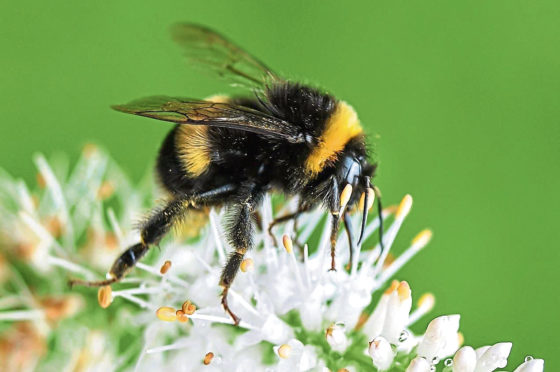It is said that during lockdown we are all paying closer attention to our world than we did before.
With most of us staying at home, and those that are going out to work experiencing a quieter world, we can notice things that we did not notice before.
Previously we might have had over-full days and rushing between here and there, so have missed so much that was going on right under our noses.
Certainly for me, I am paying attention to some things that passed me by before. The west end of Aberdeen, where I live, is very quiet.
We now have many more birds in the garden, a variety of species that are keeping us busy as we identify them, and provide appropriate habitats and food so that they might return.
Urban foxes stroll through the garden – this has never happened before. And who knew that there were so many different kinds of bees?
Encouraged by the lockdown favourite Springwatch, we are watching and listening in ways that we did not before.
I suppose we are realising that it is very difficult to look in two directions at the same time, it is hard to “have eyes in the back of our heads”. When out and about there was only so much that I could see, so I missed things right under my nose.
Now at home, my focus is on the small and beautiful signs of life around me.
Added to this, I have only so much emotional space for bad news right now, so I am concentrating on the things that are good.
There is a problem with this though: while we are looking one way, behind our backs and out of view a good number of very disturbing things are on the increase.
Not everything happening during lockdown is good.
Many kinds of crime and abuse are on the increase, taking cover under the coronavirus confusion.
With fewer people to notice and see what is happening, it is easy to get away with dreadful things.
The pattern of crime has changed through the past weeks. While workplace crime and harassment have decreased, other crimes, such as online fraud and domestic abuse have been rising.
A sign of this can been seen in TV adverts at present. In the breaks between programmes we see the encouragement to those facing abuse in their homes to make contact with others and ask for help.
While in the quietness and peace of my home I am reminded that there are many women and children who are locked down with an abuser, and who are having a very different kind of experience.
Such abuse will be happening very close to me, in the houses and flats around where I live.
And of course, it is not just happening locally, but increasing around the world right now, another pandemic echoing Covid-19, bringing its own particular kind of misery.
I find all this deeply troubling. In contrast to those who see the challenges of coronavirus and ask ‘What more can I do to help?’, there are those who see increased opportunities to benefit themselves.
While some are creative and ingenious in finding ways to reach out and support others, some use these same human capacities for ill.
Jesus said: “What is said in the dark will be heard in the daylight.” Meaning that eventually things which have been hidden will come to light.
This will be true in our society as we move further into the phased reopening.
As something like normal life resumes, as children return to schools and women emerge into larger social networks, then some of what has been going on will be revealed.
There will be children who are missing or who are not in good shape at all. There will be women who are quieter than usual.
We might notice behaviours that suggest mental health issues have deepened, and we would be right to wonder at the cause.
During lockdown many of us have learned to pay attention to small things; we need to use these same skills to pay attention to the needs of those who have been through a very difficult few months.
As we decide how limited resources of time and money will be spent in the post-lockdown world, those who suffered from the pandemic of abuse must not be forgotten.
At the beginning of the lockdown we really applied ourselves to thinking of new ways of reaching those who are most isolated or vulnerable to coronavirus.
We must use these same energies as we emerge from lockdown to those who have suffered at the hands of abusers in their own homes.
The Rt Rev Anne Dyer is Episcopalian Bishop of Aberdeen and Orkney and Scotland’s first female bishop










